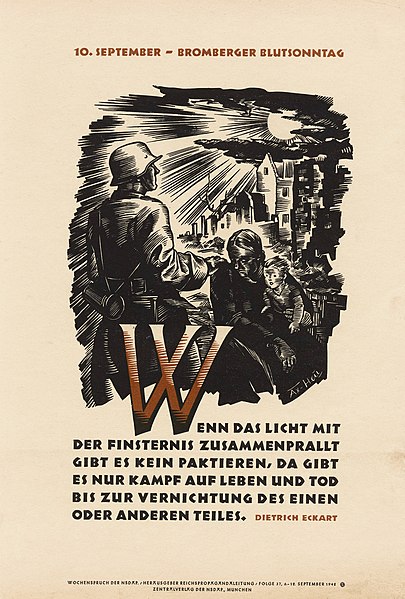Dietrich Eckart was a German völkisch poet, playwright, journalist, publicist, and political activist who was one of the founders of the German Workers' Party, the precursor of the Nazi Party. Eckart was a key influence on Adolf Hitler in the early years of the Party, the original publisher of the party newspaper, the Völkischer Beobachter, and the lyricist of the first party anthem, "Sturmlied". He was a participant in the failed Beer Hall Putsch in 1923 and died on 26 December of that year, shortly after his release from Landsberg Prison, of a heart attack.
Dietrich Eckart
Eckart as a young man
Wochenspruch der NSDAP of 6 September 1942 quotes Eckart: "If the light clashes with darkness there is no making of agreements, there is only a fight of life and death until the one or the other part is destroyed."
Dietrich-Eckart-Bühne (Dietrich Eckart theatre), 1939
The Völkisch movement was a German ethnic nationalist movement active from the late 19th century through the dissolution of the German Reich in 1945, with remnants in the Federal Republic of Germany afterwards. Erected on the idea of "blood and soil", inspired by the one-body-metaphor, and by the idea of naturally grown communities in unity, it was characterized by organicism, racialism, populism, agrarianism, romantic nationalism and – as a consequence of a growing exclusive and ethnic connotation – by antisemitism from the 1900s onward. Völkisch nationalists generally considered the Jews to be an "alien people" who belonged to a different Volk from the Germans.
magazine advocating for Volkisch politics - 1919





